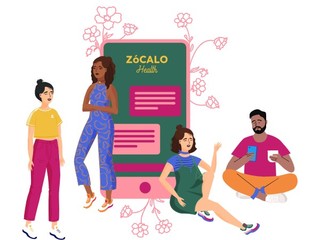Digital health funding declines for the third year in a row
AI-enabled digital health startups raised $3.7B, 37% of total funding for the sector
Read more... Zócalo Health is a healthcare service designed specifically for Latino patients, acting as the “Family Doctor” for each of its members. That means staffing care teams with members from the community, or promotores de salud and offering a range of services that are typically addressed in primary care, including mental health conditions, preventative and lifestyle needs, chronic disease management and urgent care, that Latino patients often lack access to.
Zócalo Health is a healthcare service designed specifically for Latino patients, acting as the “Family Doctor” for each of its members. That means staffing care teams with members from the community, or promotores de salud and offering a range of services that are typically addressed in primary care, including mental health conditions, preventative and lifestyle needs, chronic disease management and urgent care, that Latino patients often lack access to.
The company, which raised a $5 million round of funding last month, premiered as an invite-only service to select members earlier this summer, and now it's finally ready to go wide. On Tuesday, the company announced the launch of its primary care memberships for residents across California and Texas.
Zócalo chose to launch in those two states because they have the highest concentration of Latinos in the U.S, explained co-founder and CEO Erik Cardenas; 39% of California residents and 39.3% of Texans are Latino.
Latinos living in these states also face significant health inequities: nearly 1 in 5 Latino Californians have no usual source of care; of those, 44% say they do not have enough primary care providers in their communities to meet local needs. In Texas, 39% and 19% of non-elderly Texan Latino adults and children, respectively, are uninsured. In addition to reduced healthcare access, Hispanic adults in Texas also experience high rates of heart diseases, diabetes, and cancer.
"We’re launching in these states based on the tremendous opportunity to improve healthcare for a large number of Latino families," said Cardenas.
When patients sign up for a monthly or annual membership on Zócalo, they get access to a virtual care team led by a promotor de salud, who is available via chat seven days a week to provide health service navigation and health coaching. The care team also includes physicians, nurses, and mental health therapists, and patients also get access to same day appointments and care coordination services focused on addressing social determinants of health.
"Deploying Latino care teams is a more genuine way to cater to the unique cultural needs of this population than just simply translating content," said Cardenes.
"Our value proposition is to create relationships and to have data at our fingertips that allows us to provide a more personal and tailored experience for our patients. It’s not just about accessing a doctor’s appointment. It’s about leveraging these community health workers to build relationships that allow us to better understand which social determinants are at play so we can create a more holistic experience for our patients."
The company also offers transparent pricing, removing headaches around high deductibles and intricate medical bills, as members pay a single membership fee for navigation services, virtual visits, and access to a care team who can help them understand costs for any associated labs and prescriptions. Services are offered through monthly memberships, with pricing starting at $40 per month or at a discounted rate of $420 a year when paid upfront.
The typical customer for Zócalo platform is any Latino adult who is making healthcare decisions for themselves and/or their families; for example, it supports customers who are in their 30s and 40s are are caring for both young children and aging parents. These users may have health insurance, Cardenas explained, but their plans often include high deductibles, and they may have to attend appointments with their parents, in order to translate and provide support.
"In states across the U.S., Latinos often experience disproportionately limited access to primary care, with a ratio of one primary care physician for every five to six thousand residents in predominantly Latino zip codes. Many Latinos live in urban areas, where they wait an average of 24 days to see a doctor," said Cardenas.
"When Latinos reach the doctor’s office, the challenges continue. Though physicians may translate materials from English to Spanish, treatment stops short of true cultural awareness, since physicians may not understand why they tried home remedies first or asked their families for support."
While Cardenas couldn't say at this time which states the company is looking to launch in next, he would say that, "While population needs are acute in Texas and California, Latinos across the nation experience significant barriers to high-quality healthcare."
"We will continue to provide high-quality care to users in states where we’ve launched and expand our reach across the U.S. We want to be the leading system for Latino health when it comes to trust, experience and engaging patients."
Ultimately, Zócalo's mission is to increase awareness, recognition, and understanding of the healthcare inequalities and outcomes across the Latino community.
"Together, with the community, we can change the narrative around Latino physical and mental health. We can improve the outcomes, improve the experience for our patients and providers, all while reducing barriers to access by reducing cost."
(Image source: zocalo.health)
AI-enabled digital health startups raised $3.7B, 37% of total funding for the sector
Read more...OXcan combines proteomics and artificial intelligence for early detection
Read more...Nearly $265B in claims are denied every year because of the way they're coded
Read more...